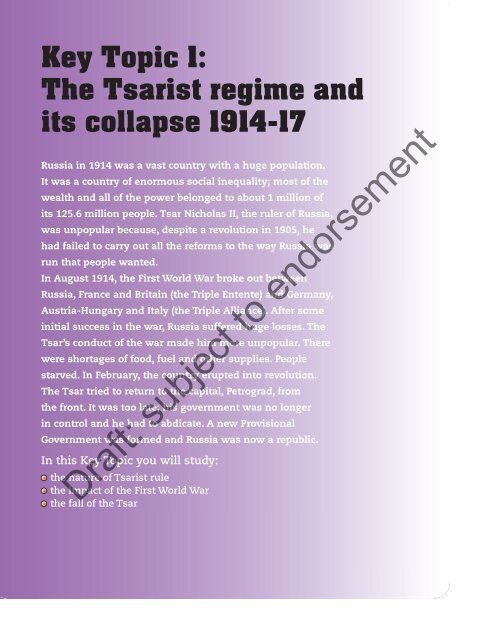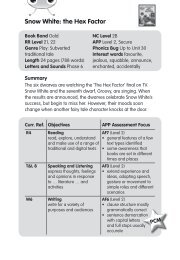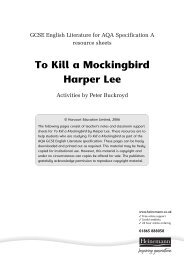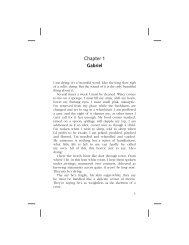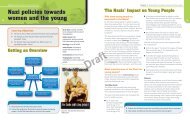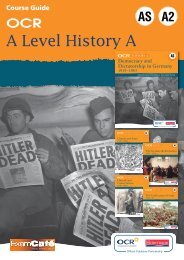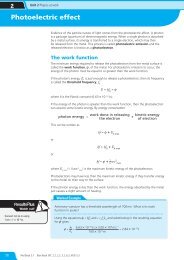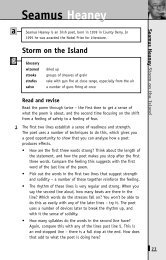History A 2B Russia in 1914 preview - Pearson Schools
History A 2B Russia in 1914 preview - Pearson Schools
History A 2B Russia in 1914 preview - Pearson Schools
You also want an ePaper? Increase the reach of your titles
YUMPU automatically turns print PDFs into web optimized ePapers that Google loves.
Key Topic 1:<br />
The Tsarist regime and<br />
its collapse <strong>1914</strong>-17<br />
<strong>Russia</strong> <strong>in</strong> <strong>1914</strong> was a vast country with a huge population.<br />
It was a country of enormous social <strong>in</strong>equality; most of the<br />
wealth and all of the power belonged to about 1 million of<br />
its 125.6 million people. Tsar Nicholas II, the ruler of <strong>Russia</strong>,<br />
was unpopular because, despite a revolution <strong>in</strong> 1905, he<br />
had failed to carry out all the reforms to the way <strong>Russia</strong> was<br />
run that people wanted.<br />
In August <strong>1914</strong>, the First World War broke out between<br />
<strong>Russia</strong>, France and Brita<strong>in</strong> (the Triple Entente) and Germany,<br />
Austria-Hungary and Italy (the Triple Alliance). After some<br />
<strong>in</strong>itial success <strong>in</strong> the war, <strong>Russia</strong> suffered huge losses. The<br />
Tsar’s conduct of the war made him more unpopular. There<br />
were shortages of food, fuel and other supplies. People<br />
starved. In February, the country erupted <strong>in</strong>to revolution.<br />
The Tsar tried to return to the capital, Petrograd, from<br />
the front. It was too late; his government was no longer<br />
<strong>in</strong> control and he had to abdicate. A new Provisional<br />
Government was formed and <strong>Russia</strong> was now a republic.<br />
In this Key Topic you will study:<br />
the nature of Tsarist rule<br />
the impact of the First World War<br />
the fall of the Tsar<br />
Draft: subject to endorsement
<strong>Russia</strong> <strong>in</strong> <strong>1914</strong><br />
<strong>Russia</strong> <strong>in</strong> <strong>1914</strong><br />
Learn<strong>in</strong>g objectives<br />
In this chapter you will learn about:<br />
• the problems of rul<strong>in</strong>g <strong>Russia</strong><br />
• the social and economic problems<br />
• the weakness of the Tsar.<br />
The problems of rul<strong>in</strong>g <strong>Russia</strong><br />
The <strong>Russia</strong>n Empire <strong>in</strong> <strong>1914</strong> was huge, 92 times<br />
as big as Brita<strong>in</strong>. It stretched from Europe <strong>in</strong> the<br />
west to the Pacific Ocean <strong>in</strong> the east and from the<br />
Arctic Ocean <strong>in</strong> the north to Afghanistan <strong>in</strong> the<br />
south. It covered about 22.3 million square km,<br />
about a sixth of all the land <strong>in</strong> the world. Its size<br />
made it very hard to govern. Communications were<br />
difficult. Roads were unpaved and slow, thick with<br />
mud for much of the year <strong>in</strong> many places. Even<br />
the new railways only connected a fraction of the<br />
country.<br />
Communication was difficult <strong>in</strong> another way, too.<br />
In 1897, when its only census was taken, <strong>Russia</strong><br />
had over 125.6 million people. Of these, only about<br />
55 million spoke <strong>Russia</strong>n. Despite this, <strong>Russia</strong>n<br />
was the language of government and people were<br />
expected to conform to <strong>Russia</strong>n ways, <strong>in</strong> a process<br />
called ‘Russification’. There were hundreds of<br />
different nationalities, liv<strong>in</strong>g <strong>in</strong> very different ways<br />
<strong>in</strong> climates that ranged from desert to permanent<br />
ice. They had one th<strong>in</strong>g <strong>in</strong> common – they were<br />
almost all peasants.<br />
Social problems<br />
The 1897 census showed terrible social <strong>in</strong>equality<br />
<strong>in</strong> <strong>Russia</strong>. Over half of the peasants had no land<br />
or homes of their own. Much of the farmland was<br />
of poor quality and farmed with old-fashioned,<br />
<strong>in</strong>effective methods. The population was ris<strong>in</strong>g and<br />
more people were mov<strong>in</strong>g to towns, so more food<br />
was needed and food shortages were common.<br />
Most of the land, most of the wealth and all of the<br />
power belonged to about 1 million of the 125.6<br />
million people. These people did not go hungry<br />
when there were food shortages.<br />
Source A: a photograph taken by a visitor to a <strong>Russia</strong>n village <strong>in</strong> the<br />
early 1900s.<br />
Occupation<br />
Population<br />
<strong>in</strong> millions<br />
Peasants 93.7<br />
Factory workers 12.3<br />
Shopkeepers 5.0<br />
Railway and communications 1.9<br />
Servants and workers hired by the day 5.8<br />
Priests and professionals 1.6<br />
Government officials, soldiers 2.2<br />
Landlords, nobles etc 2.2<br />
Crim<strong>in</strong>als and other unknowns 0.9<br />
Source B: the occupation of <strong>Russia</strong>ns <strong>in</strong> the 1897 census.<br />
Draft: subject to endorsement<br />
Exam-style question<br />
Describe the problems of rul<strong>in</strong>g <strong>Russia</strong> <strong>in</strong> 1917.<br />
(6 marks)<br />
Tip: Pick out at least three problems, and don’t just list<br />
them, expla<strong>in</strong> what made them a problem.<br />
7
Key Topic 1: The Tsarist regime and its collapse <strong>1914</strong>–17<br />
8<br />
Town life<br />
More and more peasants were mov<strong>in</strong>g to towns<br />
and cities to look for work <strong>in</strong> factories. Moscow,<br />
with a total population of 1.8 million, was the most<br />
<strong>in</strong>dustrialised city: just under 50% of all factory<br />
workers worked there. Life <strong>in</strong> the towns was not easy.<br />
Work was difficult to f<strong>in</strong>d. The hours were long, the<br />
pay was low and the work was hard and dangerous<br />
– accidents were common. Factory workers lived<br />
<strong>in</strong> the worst part of the town, often ten to a room,<br />
tak<strong>in</strong>g it <strong>in</strong> turns to sleep. Despite all this, for many<br />
it was better than be<strong>in</strong>g a peasant. Factory owners,<br />
on the other hand, lived well. They made huge profits<br />
by pay<strong>in</strong>g low wages and they spent very little on<br />
improv<strong>in</strong>g liv<strong>in</strong>g or work<strong>in</strong>g conditions for their<br />
workers.<br />
How <strong>Russia</strong> was ruled<br />
<strong>Russia</strong> was ruled by a Tsar who made all the<br />
decisions, advised by a Council of M<strong>in</strong>isters chosen<br />
from his friends <strong>in</strong> the nobility. S<strong>in</strong>ce 1613, the Tsar<br />
had always come from the Romanov family. The<br />
<strong>Russia</strong>n Orthodox Church supported the Tsars and<br />
encouraged the belief that they were above criticism<br />
and chosen to rule by God: people should always obey<br />
the Tsar and his officials. Nicholas II became Tsar<br />
<strong>in</strong> 1894. He was an <strong>in</strong>decisive man who, when told<br />
he had become Tsar, had said, ‘I am not ready to be<br />
Tsar. I know noth<strong>in</strong>g about the bus<strong>in</strong>ess of rul<strong>in</strong>g.’ He<br />
certa<strong>in</strong>ly did not th<strong>in</strong>k enough about the problems<br />
of <strong>Russia</strong>. Books and newspapers were censored to<br />
make sure they were not hostile. A secret police, the<br />
Okhrana, looked for opponents of the Tsar. These<br />
people were usually exiled to Siberia, 3,000 miles<br />
away <strong>in</strong> the icy north. Other critics left the country.<br />
The 1905 Revolution<br />
In 1905 there was a series of demonstrations and<br />
strikes aga<strong>in</strong>st the way th<strong>in</strong>gs were. Troops guard<strong>in</strong>g<br />
the Tsar’s W<strong>in</strong>ter Palace <strong>in</strong> St Petersburg fired <strong>in</strong>to<br />
a crowd of peaceful demonstrators, kill<strong>in</strong>g 130 and<br />
wound<strong>in</strong>g many more. This produced more strikes<br />
and more unrest. The St Petersburg strikers formed a<br />
soviet – a workers’ council to organise strikes. Work <strong>in</strong><br />
the city stopped. Soviets were organised <strong>in</strong> more and<br />
more towns and cities. They took over <strong>in</strong> some places,<br />
replac<strong>in</strong>g the Tsar’s government.<br />
Source C: a soup kitchen for the unemployed <strong>in</strong> St Petersburg <strong>in</strong><br />
the early 1900s. Soup kitchens provided a very basic meal for the<br />
unemployed, usually once a day.<br />
At times <strong>in</strong> 1905 the government lost control<br />
of some towns, cities and areas, as <strong>in</strong>dustrial<br />
workers staged huge strikes. There were<br />
repeated mut<strong>in</strong>ies <strong>in</strong> the army and the navy. A<br />
nationwide general strike <strong>in</strong> October brought<br />
the country to a near standstill.<br />
Draft: subject to endorsement<br />
Source D: from The Soviet Experiment, written by R G Suny<br />
<strong>in</strong> 1998.
<strong>Russia</strong> <strong>in</strong> <strong>1914</strong><br />
A second chance<br />
Nicholas II had to act quickly to survive. He set up<br />
a Duma (parliament) of two Houses, one elected<br />
by the people and the other of nobles appo<strong>in</strong>ted by<br />
the Tsar, to advise him. He agreed to allow political<br />
parties and trade unions (these had been illegal).<br />
Many groups that had met <strong>in</strong> secret began to<br />
hold public meet<strong>in</strong>gs and demand reforms. These<br />
<strong>in</strong>cluded the soviets, which still had a lot of public<br />
support <strong>in</strong> the towns and cities, especially<br />
St Petersburg. Opposition to the Tsar was now<br />
more obvious.<br />
Rasput<strong>in</strong><br />
The Tsar and Tsar<strong>in</strong>a’s only son, Alexi, had<br />
haemophilia, a medical condition that stops blood<br />
clott<strong>in</strong>g. At the time, there were no drugs to control<br />
this condition so even small cuts and bruises were<br />
a problem and could be fatal. Alexi’s condition was<br />
kept secret from almost everyone.<br />
In 1905 the Tsar and Tsar<strong>in</strong>a first heard of a<br />
‘holy man’ called Rasput<strong>in</strong>, who could help with<br />
haemophilia. In 1907, Alexi was very ill and<br />
Rasput<strong>in</strong> was called for. He stopped the bleed<strong>in</strong>g.<br />
The Tsar and Tsar<strong>in</strong>a came to rely on Rasput<strong>in</strong><br />
more and more. He was very unpopular, even <strong>in</strong><br />
the Tsar’s court, because of his grow<strong>in</strong>g <strong>in</strong>fluence<br />
over them. No-one understood it, because hardly<br />
anyone knew of Alexi’s condition. Some disliked<br />
Rasput<strong>in</strong> because he was from a peasant family,<br />
others because they thought he was a fraud. But he<br />
seemed to help Alexi. So, despite protests, the Tsar<br />
and Tsar<strong>in</strong>a protected him and kept him at court.<br />
Back to old ways<br />
Tsar Nicolas did not want to share power as he<br />
believed that God had given him the right to<br />
rule alone. There was a huge difference between<br />
what he had promised <strong>in</strong> October 1905 and what<br />
he would really allow. When the Duma began to<br />
demand reforms he changed the vot<strong>in</strong>g system for<br />
the Duma, try<strong>in</strong>g to make sure only people who<br />
would agree with him were elected.<br />
As time passed, the Tsar began to feel safe aga<strong>in</strong>.<br />
He stopped call<strong>in</strong>g the Duma at all as even that<br />
elected by his new rules wanted reform. By 1907<br />
the Okhrana, was openly break<strong>in</strong>g up the meet<strong>in</strong>gs<br />
of political parties and trade unions, even though<br />
these meet<strong>in</strong>gs were legal. Leaders were arrested<br />
on false charges and sent to prison, or to exile <strong>in</strong><br />
Siberia. The persecution was <strong>in</strong>tended to break up<br />
these groups, and it partly succeeded.<br />
Many political groups returned to meet<strong>in</strong>g <strong>in</strong><br />
secret. Some had to work <strong>in</strong> exile, while others<br />
left the country. Many small soviets still met,<br />
but the St Petersburg Soviet, which had been the<br />
most <strong>in</strong>fluential (so was most persecuted) stopped<br />
meet<strong>in</strong>g <strong>in</strong> 1905.<br />
Source E: a <strong>Russia</strong>n cartoon from the time, show<strong>in</strong>g how many<br />
<strong>Russia</strong>ns thought Rasput<strong>in</strong> controlled the Tsar and Tsar<strong>in</strong>a.<br />
Draft: subject to endorsement<br />
9
Key Topic 1: The Tsarist regime and its collapse <strong>1914</strong>–17<br />
10<br />
Opposition<br />
Opposition to the Tsar’s new government after the<br />
changes of 1905 fell <strong>in</strong>to four ma<strong>in</strong> groups:<br />
• Monarchists who wanted a return to the Tsar<br />
rul<strong>in</strong>g alone. They disliked the new government<br />
that <strong>in</strong>cluded the Duma.<br />
• Constitutionalists who wanted to keep the Tsar,<br />
limit his power with a constitution and some<br />
k<strong>in</strong>d of parliament. The most important were the<br />
Constitutional Democratic Party (the Kadets), the<br />
Octobrists and the Progressists. Most members<br />
of the first Dumas (before the Tsar changed the<br />
vot<strong>in</strong>g system) came from these parties.<br />
• Revolutionaries who wanted to replace the<br />
Tsarist system with a fairer one. The largest<br />
group was the Social Revolutionaries, who<br />
believed <strong>in</strong> a revolution led by the peasants.<br />
Some revolutionary parties followed the ideas<br />
of the revolutionary socialist, Karl Marx. The<br />
largest of these, the Social democrats, believed <strong>in</strong><br />
a revolution led by the workers <strong>in</strong> the towns and<br />
cities. Many of these groups were exiled when<br />
the Okhrana stepped up its persecution.<br />
• Soviets who wanted reforms to help ord<strong>in</strong>ary<br />
workers. They were loyal to the Tsar at first; they<br />
just wanted him to see their problems and help.<br />
This view changed as it became clear he was not<br />
<strong>in</strong>terested <strong>in</strong> their problems.<br />
Problems outside <strong>Russia</strong><br />
Europe at the start of <strong>1914</strong> was a tangle of<br />
alliances. Germany, Austria-Hungary and Italy<br />
had formed the Triple Alliance. <strong>Russia</strong>, Brita<strong>in</strong><br />
and France had formed the Triple Entente. All<br />
these countries had treaties with smaller ones.<br />
One of <strong>Russia</strong>’s allies was Serbia, a country <strong>in</strong> the<br />
Balkans that wanted <strong>in</strong>dependence from Austria-<br />
Hungary. When the heir to Austria’s throne, Franz<br />
Ferd<strong>in</strong>and, was assass<strong>in</strong>ated <strong>in</strong> Sarajevo by a<br />
Serbian <strong>in</strong>dependence group, Austria declared war<br />
on Serbia. <strong>Russia</strong> had promised to protect Serbia,<br />
so jo<strong>in</strong>ed the war, br<strong>in</strong>g<strong>in</strong>g <strong>in</strong> France and Brita<strong>in</strong>.<br />
Meanwhile Italy and Germany jo<strong>in</strong>ed <strong>in</strong> to help<br />
Austria-Hungary. Other countries followed, hauled<br />
<strong>in</strong> by treaties.<br />
The First World War had begun.<br />
Soviets<br />
What<br />
‘Soviet’ is the <strong>Russia</strong>n word for a Council or Committee.<br />
The lowest level soviets were set up by workers <strong>in</strong> a<br />
factory, or soldiers <strong>in</strong> a unit. All the soviets <strong>in</strong> a city could<br />
jo<strong>in</strong> together to form a city soviet, like the St Petersburg<br />
Soviet. Each smaller soviet sent some representatives to<br />
sit on the city soviet.<br />
Why<br />
To start with, soviets were not much more than strike<br />
committees. However, revolutionaries soon realised they<br />
were the best way to organise the workers, and so get<br />
some real power. Bolsheviks tried to make sure they were<br />
among the leaders of all soviets.<br />
When<br />
1905 used by St Petersburg workers <strong>in</strong> the failed revolution.<br />
1917 an important part of the February Revolution.<br />
Eventually (September) dom<strong>in</strong>ated by radicals, especially<br />
the Bolsheviks, they were a threat to the Provisional<br />
Government – and more representative of the people.<br />
After the revolution the constitution made them part of<br />
the system of government. Soviets elected members to<br />
larger soviets all the way up to the Supreme Soviet – the<br />
top level of the government.<br />
Activities<br />
1 Draw a diagram to show what would happen if there<br />
was a revolution <strong>in</strong> your school, and it was run by<br />
soviets. What would be the smallest soviet, and how<br />
many levels of soviets would you need?<br />
2 a In pairs, write the problems <strong>in</strong> <strong>Russia</strong> onto small<br />
cards. Now sort them <strong>in</strong>to two piles: geographical<br />
problems and political problems.<br />
b Pick the problem you th<strong>in</strong>k is most likely to lead to<br />
revolution and write a paragraph expla<strong>in</strong><strong>in</strong>g why.<br />
3 Write a slogan for each of the ma<strong>in</strong> political parties<br />
<strong>in</strong> 1917.<br />
Draft: subject to endorsement


